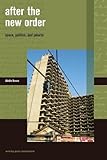After the New Order : Space, Politics, and Jakarta / Abidin Kusno; ed. by Phillip Darby.
Material type: TextPublisher: Honolulu : University of Hawaii Press, [2013]Copyright date: ©2013Description: 1 online resource (304 p.) : 33 illusContent type:
TextPublisher: Honolulu : University of Hawaii Press, [2013]Copyright date: ©2013Description: 1 online resource (304 p.) : 33 illusContent type: - 9780824837457
- 9780824838669
- 307.1/2160959822 23
- HT169.I54 J3765 2014
- online - DeGruyter
- Issued also in print.
| Item type | Current library | Call number | URL | Status | Notes | Barcode | |
|---|---|---|---|---|---|---|---|
 eBook
eBook
|
Biblioteca "Angelicum" Pont. Univ. S.Tommaso d'Aquino Nuvola online | online - DeGruyter (Browse shelf(Opens below)) | Online access | Not for loan (Accesso limitato) | Accesso per gli utenti autorizzati / Access for authorized users | (dgr)9780824838669 |
Browsing Biblioteca "Angelicum" Pont. Univ. S.Tommaso d'Aquino shelves, Shelving location: Nuvola online Close shelf browser (Hides shelf browser)

|

|

|

|

|

|

|
||
| online - DeGruyter Making Micronesia : A Political Biography of Tosiwo Nakayama / | online - DeGruyter The Lama Question : Violence, Sovereignty, and Exception in Early Socialist Mongolia / | online - DeGruyter In Transit : The Formation of a Colonial East Asian Cultural Sphere / | online - DeGruyter After the New Order : Space, Politics, and Jakarta / | online - DeGruyter Capturing Contemporary Japan : Differentiation and Uncertainty / | online - DeGruyter The Pacific Festivals of Aotearoa New Zealand : Negotiating Place and Identity in a New Homeland / | online - DeGruyter Colors of Veracity : A Quest for Truth in China and Beyond / |
Frontmatter -- Contents -- Acknowledgments -- Introduction -- Longue Durée -- Chapter 1. The Nation- State and the City Hall -- Chapter 2. The Shop House and the Chinese -- Time Remembered/Time Forgotten -- Chapter 3. Researching Modernism -- Chapter 4. The Peasantry and the Periurban Fringe -- Spatial Conjunctures -- Chapter 5. The Coast and the Last Frontier -- Chapter 6. Green Governmentality -- Chapter 7. Housing the Margin -- Epilogue Turning Time: An Interview -- Notes -- Bibliography -- Index -- About the Author
restricted access online access with authorization star
http://purl.org/coar/access_right/c_16ec
After the New Order follows up Abidin Kusno's well-received Behind the Postcolonial and The Appearances of Memory. This new work explores the formation of populist urban programs in post-Suharto Jakarta and the cultural and political contradictions that have arisen as a result of the continuing influence of the Suharto-era's neoliberal ideology of development. Analyzing a spectrum of urban agendas from waterfront city to green environment and housing for the poor, Kusno deepens our understanding of the spatial mediation of power, the interaction between elite and populist urban imaginings, and how past ideologies are integral to the present even as they are newly reconfigured.The book brings together eight chapters that examine the anxiety over the destiny of Jakarta in its efforts to resolve the crisis of the city. In the first group of chapters Kusno considers the fate and fortune of two building types, namely the city hall and the shop house, over a longue duree as a metonymy for the culture, politics, and society of the city and the nation. Other chapters focus on the intellectual legacies of the Sukarno and Suharto eras and the influence of their spatial paradigms. The final three chapters look at social and ecological consciousness in the post-Suharto era. One reflects on citizens' responses to the waterfront city project, another on the efforts to "green" the city as it is overrun by capitalism and reaching its ecological limits. The third discusses a recent low-income housing program by exploring the two central issues of land and financing; it illuminates the interaction between the politics of urban space and that of global financial capitalism. The epilogue, consisting of an interview with the author, discusses Kusno's writings on contemporary Jakarta, his approach to history, and how his work is shaped by concerns over the injustices, violence, and environmental degradation that continue to accompany the city's democratic transition. After the New Order will be essential reading for anyone-including Asianists, urban historians, social scientists, architects, and planners-concerned with the interplay of space, power, and identity.
Issued also in print.
Mode of access: Internet via World Wide Web.
In English.
Description based on online resource; title from PDF title page (publisher's Web site, viewed 02. Mrz 2022)


